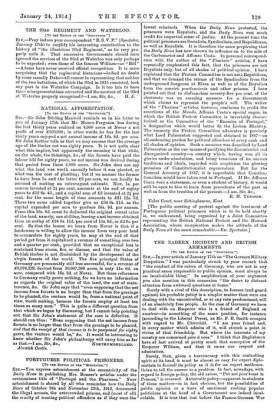PORTUGUESE POLITICAL PRISONERS. (To TR. Horror or rem ' , Error...or...1
Sii,—You express astonishment at the eccentricity of the Daily Netos in publishing Mrs. Bonner's articles under the acrimonious title of "Portugal and the Pharisees." Your astonishment is shared by all who remember bow the Daily News of October 9th and November 25th, 1912, denounced the illegal arrests, the overcrowded prisons, and (most of all) the cruelty of treating political offenders as if they were the
lowest criminals. When the Daily News protested, the prisoners were Royalists; and the Dolly News won much credit for impartial sense of justice. At the present time the political prisoners are Socialists, Syndicalists, and Republicans, as well as Royalists. It is therefore the more perplexing that the Daily News has now thrown its influence on to the side of the Carbonarios and Affonso Costa. In personal correspond- ence with the author of the "Pharisee" articles, I have repeatedly emphasized this fact, that the prisoners are not Royalists only, but of all shades of political opinion. I have explained that the Protest Committee is not anti-Republican, and that we demand the release of the Syndicalista from the underground dungeons at Elves as well as of the Royalists from the convict penitenciaria and other prisons. I have pointed out that to disfranchise seventy-five per cent, of the electorate was an amazing measure for a Government which claims to represent the people's will. The writer of the "Pharisee" articles, however, continues to credit the assertions of the Mundo, Alfonso Costa's special organ, in which the British Protest Committee is invariably charac- terized as the Committee of the "Enemies of Portugal," a designation which would better fit the Lisbon Ministry. The amnesty the Protest Committee advocates is precisely what Lord Palmerston suggested and obtained in 1847—an all-embracing pardon for political offenders of every rank and all shades of opinion. Such a measure was described by Lord Palmerston as the one means of pacifying the discontented and disorganized country—a country which, having won all its glories under absolutism, and being tenacious of its ancient traditions and ideals, regarded with scepticism the glowing promises of Constitutionalist regenerators. But for the General Amnesty of 1847, it is improbable that Constitu- tionalism would have taken root in Portugal. If Dr. Affonso Costa were a statesman, or even a student of history, it would still be open to him to learn from precedents of the past as well as from the troubles of the present.—I am, Sir, &a,
[The public meeting of protest against the treatment of Portuguese political prisoners which is to be held shortly is, we understand, being organized by a Joint Committee representing the British National Protest and the Howard Association, whose co-operation mace the attitude of the Daily News all the more remarkable.—En. Spectator.]






































 Previous page
Previous page